Tagged: Prairie Theatre Exchange
The Third Color at the Prairie Theatre Exchange
- by Alyson Shane
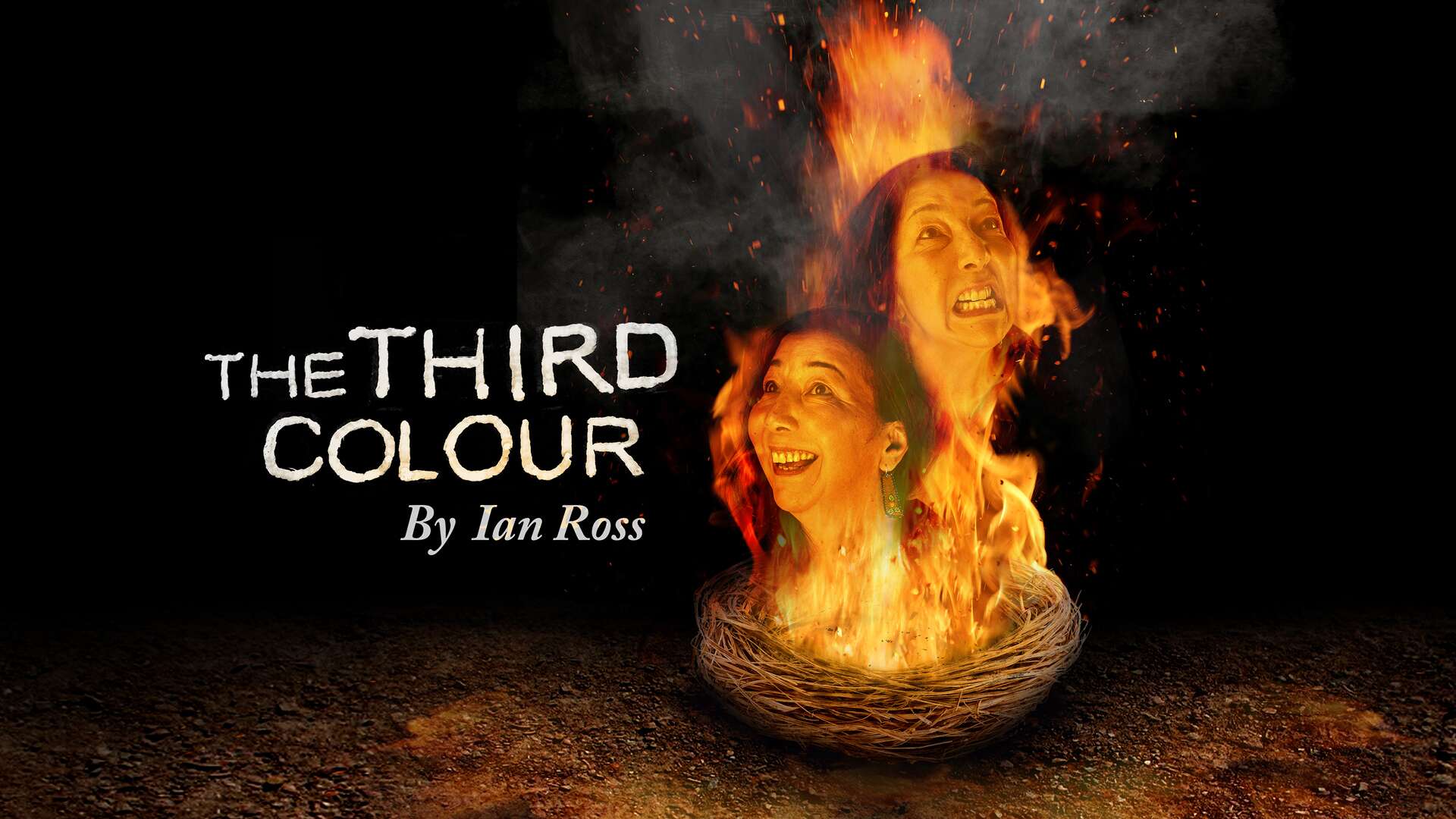
Image via the Prairie Theatre Exchange.
I met Ian Ross a lifetime ago. Or, rather, what feels like a lifetime ago.
We worked in the same building, and when we were introduced our colleague said something to the effect of:
"This is Ian. He's kind of a big deal" and the way he laughed it off and joked about it told me that
1. He was probably kind of a big deal*
2. We'd probably get along
I was in a really bad place at the time, and I leaned on Ian a lot to talk about what I was dealing with, and how frustrated and overwhelmed I often felt about the prospects of my future.
Ian, through the simple act of listening and asking questions (which no "adult" in my life had really done at that point) helped me work through my feelings as I tried to make sense of the world around me.
I was confused. I didn't understand how I'd gotten myself into the mess I found myself in, and I felt at a loss as to the best way forward.
So it was funny, and ironic in a way, that I found myself confronted with those same questions - "how did we get here?" and "what do we do now?" - through the lens of his most recent play The Third Color.
The play focuses on two spirits who have taken the shapes of Indigenous women: Head Full of Lice, played by Kathleen MacLean, and Agatu, played by Tracey Nepinak.
Through dialogue that manages to somehow be sharp, resonant, and often hilarious at the same time, the spirits explore Canada's history from pre-settlers to the present day.
Over and over again, the spirits butt heads (and, in some cases, got into physical skirmishes) over whether or not helping the settlers was, in fact, the right thing to do.
Agatu, who takes the form of an elderly woman, pities the settlers who are sick and need their help. She insists that, even if the outcome isn't what they expect, that it's the "right" thing to do.
Head Full of Lice, on the other hand, is furious. She sees the generational hurt and trauma inflicted upon Indigenous peoples and repeatedly states that she wants to "burn it all down," even going so far as to take out a Canadian flag and threaten to burn it out of rage.
"Where is the third color?" they both ask, looking at the Canadian flag.
Our Canadian flag is red and white. Red is symbolic of England and white of France... but where are the Indigenous peoples in our flag?
Where are their histories? Their stories? Their presence in the literal fabric of our country?
Through their dialogue, Head Full of Lice and Agatu represent opposing viewpoints in terms of reconciliation - should Indigenous peoples accept that "this is what we have" and try to move forward, or should they burn it all down and start again from scratch?
As a non-Indigenous person I have no real understanding of the feelings that Indigenous peoples must feel towards reconciliation in Canada. But through Head Full of Lice and Agatu's discussion I was able to get a glimpse of the complicated - and contradictory - feelings that Indigenous folks like Ian must be experiencing during this period in our history.
Which, I think, is what makes the play such an important contribution to the discussion surrounding the reconciliation attempts happening in Canada right now.
Through its comedy and drama and fierce bouts of emotion, The Third Color represents an important perspective that is timely, relevant, and challenging, while also leaving space for the audience to sit with their feelings, mixed and uncomfortable though they may be.
Art should challenge us to push the limits of our comfort zones, and that's exactly what Agatu and Head Full of Lice do throughout the play.
It made me think of the famous Duke Ellington quote that states: Art should be dangerous.
I couldn't agree more.
The Third Color is playing at the Prairie Theatre Exchange from October 2 - 20. I highly recommend checking it out.
**Big thanks to the PTE for the free tickets, and the chance to see and write about this important piece of art.**
What's your relationship with your parents like?
- by Alyson Shane
If you're like me, or even like a lot of other people out there, then you probably have a somewhat complicated relationship with your parents.
These conflicts and complications happen because dynamics are difficult to navigate; it's hard to be emotionally connected and love someone who may be vastly different from you, or who hurts you, confuses you, or struggles to connect with you emotionally.
As children, it falls on our shoulders to try to understand and unpack our parents:
What decisions and life experiences led them to this place in life?
How did these experiences shape their personalities and parenting style?
What can we do to bridge the gap between their values and beliefs, and those of a new generation?
(I think about these things a lot, in case you haven't noticed.)
Someone else who clearly thinks about these things a lot is Tetsuro Shigematsu, the performer behind the play Empire of the Son, which is currently playing at the Prairie Theatre Exchange.
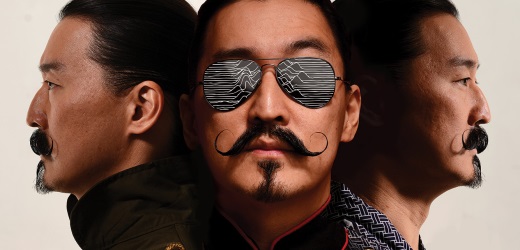
Image via the Prairie Theatre Exchange
Empire of the Son is a one-man show written and performed by Tetsuro Shigematsu (former host of CBC Radio One’s The Roundup) which employs a variety of mediums from monologues, to video, recorded audio, to live-action video using miniature sets, and more, to explore the complex relationship between himself and his father, also a CBC broadcaster.
Or, as the poster so aptly put it: Two Generations and the Silence Between Them (how perfect is this description, by the way?)
The play focuses on Shigematsu's emotionally distant father, Akira, and his struggle to reconcile his father's lasting impact through his work as a radio broadcaster for the BBC and CBC, and how emotionally distant and reserved he was with his family.
I'll be honest: I typically have a hard time getting into one-man shows as I tend to find the disconnect when an actor switches between characters to be rather jarring, but there was a distinct physical difference between when Shigematsu was "Tetsuro" and when he was acting as "Akira" that may have turned me into a one-man show convert:
Shigematsu's impressions of his father seemed to take over his whole body; his posture changed, his facial expressions changed, and his inflection and pronunciation were so dramatically different from the jovial person telling the story that it often felt like there was another person onstage, entirely.
At the same time, you could tell that these impressions, and his ability to deliver them so effectively, were crafted with the kind of love and intimate knowledge that only very close family members and friends tend to have with one another.
As Shigematsu led us through his father's life we came to understand the contradiction he felt about his father: for someone who broadcasted to the world and regularly talked to people across the globe, he struggled to open up to and connect emotionally with his own children.
It's revealed that though his father was an influential figure and led a storied life which included some astounding moments (having tea with the Queen, being present in the room when Marilyn Monroe serenaded JFK, and - most notably - being in Hiroshima when the atomic bomb was dropped) Shigematsu only began to 'real' conversations with his father when he began interviewing him towards the end of his life.
This contrast hit home, and served as a reminder that, often, the most we know of previous generations is what they choose to share, and unless we take the time to tease it out of them, their stories and experiences may be lost forever.
(As someone who studied oral history in university, I found this fascinating, by the way.)
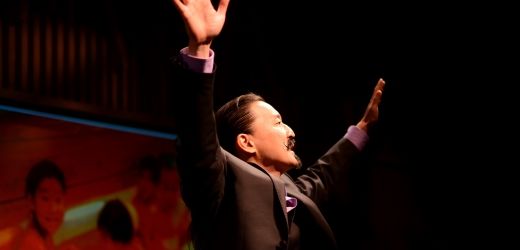
Image via the Prairie Theatre Exchange
This intimate solo performance was enhanced by Shigematsu's larger-than-life stage presence and his interesting use of a camera and miniature props located on a long table onstage. A DSLR camera (I think) was strapped to it, and at times Shigematsu would move casually over to the table, arrange some of the tiny props, and stream the live video camera footage to the screen behind him.
If this sounds strange, it was - but that only enhanced how effective this method of adding an additional visual layer was to the overall story. Personally, I've never seen someone manage to imitate two different people and move around on a miniature skateboard with just their middle ad index fingers, have you?
At the outset of the performance Shigematsu shares that he hasn't cried since he was a child, and shared his hope that performing this story in front of an audience would help him do so.
Personally, I shed enough tears for both Shigematsu and myself.
This poignant, captivating and strikingly funny memoir is one that I highly recommend seeing.
Additionally, we were lucky enough to catch Empire of the Son on the night of the Prairie Theatre Exchange's Leap Series, a new event in partnership with Manitoba Music focusing on out-of-the-box plays and music from local artists. If you're looking for a date night, or an opportunity to dive into the world of independent theatre, make sure to check out their next Leap Series event happening in February (and say hi to me if you do!)
**Big thanks to the folks at the Prairie Theatre Exchange for giving me free tickets to see their 2018/2019 season in exchange for these posts. It's a wonderful treat to be able to support and promote Winnipeg's independent theatres.**
In My Community: Gracie at the Prairie Theatre Exchange
- by Alyson Shane
I have a confession: I'm a little obsessed with The Church of Jesus Christ of Latter-Day Saints and its polygamous culture. Weird, I know, but bear with me.
I grew up in a largely unreligious household; I somewhat recall my mom mentioning Sunday School to me when I was a kid, but her big selling point was hot dog days and camping trips, not a deep, personal connection with some higher power. In fact, the closest I remember getting to any sort of organized religion growing up was seeing The Church of Jesus Christ of Latter-Day Saints (LDS) commercials on the American cable networks.
Partially as a result, I now identify as an Atheist, but that hasn't stopped me from developing a weird obsession with religion, especially the more "fringe" versions of beliefs like Christianity like the Mormon LDS faith. It started with Mitt Romney, the 2012 Republican Presidential nominee who apparently wore magic underwear, and became exacerbated when I started watching the HBO show Big Love, a fictional narrative about an LDS polygamist and his three wives.
I'm fascinated by sub-cultures, so it probably comes as no surprise that I was thrilled to discover that Gracie, the first play in the Prairie Theatre Exchange's new season, is all about Mormons and polygamous relationships.

The Play
At it's core, 'Gracie' is a play about self-discovery, rejection, and acceptance. Written by playwright Joan MacLeod, it follows a young girl from the LDS church as her family moves from America to Canada to live on a polygamous compound in British Columbia.
When we first meet Gracie (played by the incredible Samantha Hill) she's eight years old, sitting in a van with her mother and siblings on her way to their new life in Canada. Her mother is getting married, and when they arrive in their new community they're greeted by a group of individuals: boys on bikes, teenage girls carrying their babies, and her mother's new husband, to whom she will be the 18th wife.
(Please excuse me while I shudder for a moment)
During this introduction Gracie meets a young girl named Allie, and they become fast friends, and throughout the course of the play Gracie grows up right before our eyes. By the second act, which takes place four years later, Gracie and Allie are practicing for the exaltation. At school, Gracie bemoans the fact that she has to learn arithmetic in addition to other subjects like English, "science" and "social studies" where half the class studies Jesus Christ and the other studies Joseph Smith, the founder of the Mormon faith.
During this time Gracie's brother gets a job, and her sisters are both married off and begin having children with their assigned husbands. At this point, during the final segment of the play, Gracie is about to turn 16 - marrying age in her community.
During this time Gracie struggles with her changing feelings about her beliefs, culture, and circumstances, and this one-woman play quickly transforms from charming-yet-unnerving overview of a religious subculture to a moving and powerful story about the complex private lives of LDS women which we rarely see beyond TV shows or court testimonials.
Exploring Perspectives
One of the things that struck me about 'Gracie' was how MacLeod used to play to explore uncomfortable subjects like polygamy, religion, and alternative lifestyles and beliefs in a way which felt nonjudgemental; in fact, the play often felt more like a serving of reality than a heavily-researched theatre production.
As a non-religious person I find it's often all-too-easy to dismiss the complex, three-dimensional experiences of women raised in the LDS church. It's easy to say: if it's so bad, why not leave? but plays like Gracie do a tremendous job of reminding us that everyone is an individual with complex, nuanced views and experiences.
One moment which struck me was when Gracie refers to the 'grannies', groups of older women who protest outside the LDS compound with picket signs, outraged at what they perceive to the atrocities being committed within the community:
"They don't like the way we live even though they know nothing about us," Gracie says.
Complicated Positions
As a non-religious person, I often struggle to understand the appeal and value of religious beliefs, and I appreciated watching a performance which didn't pander to my preconceived notions about the LDS church and polygamy in general.
In fact, the play was so well-written that Gracie's experiences, interpretations, and reactions to the events happening to her family and within her community felt more like reading a young girl's diary than a fictional exploration of an unusual religious subculture.
Though I often felt gut-based reactions to certain experiences (such as her mother being someone's 18th wife, and all of the ways it aggravates and upsets my 3rd wave feminist views of the world), MacLeod does a tremendously good job of exploring Gracie's world in ways which feel authentic and realistic, without the bombast which often accompanies literary works which explore religious subcultures.
Evoking Empathy
If anything Gracie acts as a terrific opportunity to explore a secretive, unusual religious subculture without feeling like a voyeur. While the play presents a myriad of uncomfortable and unusual situations that the modern girl (religious or not) doesn't experience, it does so without judgment; it really does feel like a honest, authentic exploration of one girl's perspective on a community which initially makes sense, but which ultimately she (and we) fail to understand and accept.
Gracie runs at the Prairie Theatre Exchange until October 29th, and I highly recommend catching it before it's gone. Not only is it a tremendously good play, but it's a fascinating and highly entertaining exploration of a lesser-known religious subculture.
In My Community: Mom's the Word at the Prairie Theatre Exchange
- by Alyson Shane
I'm not going to lie to you: I had some reservations about seeing this play (for those of you that don't know, I've been no-contact (NC) with my parents since February of 2015.)
As a result, the idea of seeing a play about motherhood - something that I have yet to experience, and have thus far only really had negative experiences with - gave me some anxiety. I wasn't sure if I wanted to see the play because I worried that listening to stories of motherhood - of love, of unconditional caring and support - would hurt too much.
However, I also realized that it would be a good opportunity to face a fear (and support the Prairie Theatre Exchange*, which I'm always happy to do), so off we went to check out Mom's the Word.
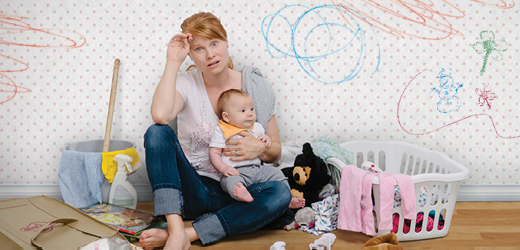
Image via PTE
A play by moms, for moms
Mom's the Word was conceived by a group of actresses and moms living in Victoria, BC in 1995, who all came together to share their stories of the trials and tribulations of motherhood. Together, they pooled their experiences and stories to form a cabaret-style, musical-ish play of sorts which touches on a variety of issues, including: postpartum depression, diapers (and diaper bags), panic, discipline, sex, changing bodies, and much more.
The play opened with a monologue from Jill (played by Yumi Ogawa) about childbirth which was... terrifying, to say the least. I've never had children, but I hope to someday, and seeing such a raw performance of the anxiety, stress, and sheer animalistic power of birthing was a bit unnerving. But, at the same time, it felt oddly inclusive; like this was a trial that every mother goes through, and an experience that is uniquely female.
One of the other mothers, Robin (played by Lisa C. Ravensbergen), gave a hilarious monologue in which she described how she and her equally foul-mouthed partner accidentally taught their child to swear at an early age.
"I tell people he's just saying 'truck' and can't pronounce it properly" she laughs, looking exasperated and embarrassed. This hit home: both John and I include "colourful words" in our everyday vocabulary, and have no shame about it, but the outside perception that we may teach our kids "bad words" too soon in their lives, and be judged for it, is something I've thought about. It felt like such a relief to hear someone addressing it!
Women supporting women
The thing that I loved the most about Mom's the Word, though, was the focus on empowerment through storytelling. Motherhood (from what I can tell) seems like it can be a tremendously isolating experience at times, and it was encouraging to see the moms in the story reaching out and supporting one another.
These struggles were covered really well in the monologues delivered by Jill's character. Over the course of the play she narrates 'letters' to her husband, trying to explain and make sense of the different experiences they're both having (staying at home with the kids vs. maintaining a demanding career) which were, at times, utterly heartbreaking.
"How can I explain what my day was like to you?" she asks "most of my day is spent in silence; how can I put the look our baby and I shared into words?" As John, who came with me, gripped my hand I realized that these were going to be very real issues that I would one day have to face and make sense of, myself.
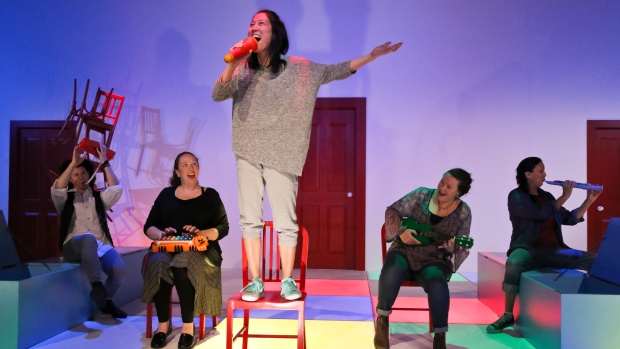 Image via CBC Manitoba
Image via CBC Manitoba
Laughter as medicine
The play wasn't all sad monologues and stressing out about dirty diapers; in fact, Mom's the Word presented the topic of motherhood in unabashed, shameless, hilarity.
In one scene, Alison (played by Trish Cooper) walks onstage jiggling a carrier as she tries to lull her infant (who was born prematurely) to sleep. Her baby falls asleep, but her muscle memory causes her to keep jiggling for several minutes as she addresses the audience. In another, Deborah (played by Jenny Wasko-Paterson) struggles through oral sex (taking bites of a banana onstage) as she says things like:
"I still want you to feel good"
"Oh no, I don't mind. I feel sexy when you feel sexy..." *eye roll*
This monologue is clearly demonstrating the struggles that many moms have with reconciling how tired, worn-out, and unsexy they feel, and the struggle to maintain a sexual relationship with their male counterparts who aren't feeling the same strain. Again, this is an area that worries me as a potential future-mom, and I appreciated that it was addressed and normalized within the context of the play.
The stand out scene for me, however, was one in which Deborah's character took her young son to the local pool. Her interactions with the toddler-age child, the fumbling, the mess, and the hilarious antics which ensued reminded me so much of being a young person, and spending my summers in the daycare my mom ran out of our house, which was always filled with toddlers exhibiting the exact behaviours described in the play.
As someone who doesn't yet have children and has a lot of mom-related baggage, Mom's the Word struck a series of chords that I didn't realize where inside of me. Yes, it was hard to watch some points, but the actors put words to many of the fears and anxieties that I have about motherhood, and presented difficult and stressful scenarios as ones which felt relatable, even to a non-mom like me.
Mom's the Word reassured me that, even if the world of parenting is going to be 'trucking' hard sometimes, at least I'll be able to laugh about it.
----
Mom's the Word is currently playing at PTE until November 27, 2016.
* Disclaimer: I get free tickets to see plays at the PTE in exchange for writing these reviews (it's wonderful)
In My Community: SPIN (or, I saw the strangest play last night)
- by Alyson Shane
Last night, despite frigid temperatures and hostile winds, John and I trekked out to the Prairie Theatre Exchange to check out the opening night of SPIN, an unusual spoken-word, musical, theatrical oddball of a play featuring a string section, two guitars, a projector, and a bicycle as an instrument.
It was by far the weirdest play I've ever seen, and I totally loved it.
For those of you who don't know me personally, I'm obsessed with riding my bike. I first got into cycling as an adult when the guy I was seeing at the time and I purchased matching his & hers vintage road bikes for $40. They were named Vikki & Vance, and I loved them.
A few years later an unfortunate (car) accident led to me purchasing my current velocipede, Barbara Streisand, whom I now ride all over town the moment the weather allows it. I love cycling; it's an amazingly freeing and fun activity, and there are literally few things that I love more than riding my bike around on a warm day in the sunshine.
So, naturally when I was offered free tickets to see SPIN, a play about cycling, I jumped at the opportunity.
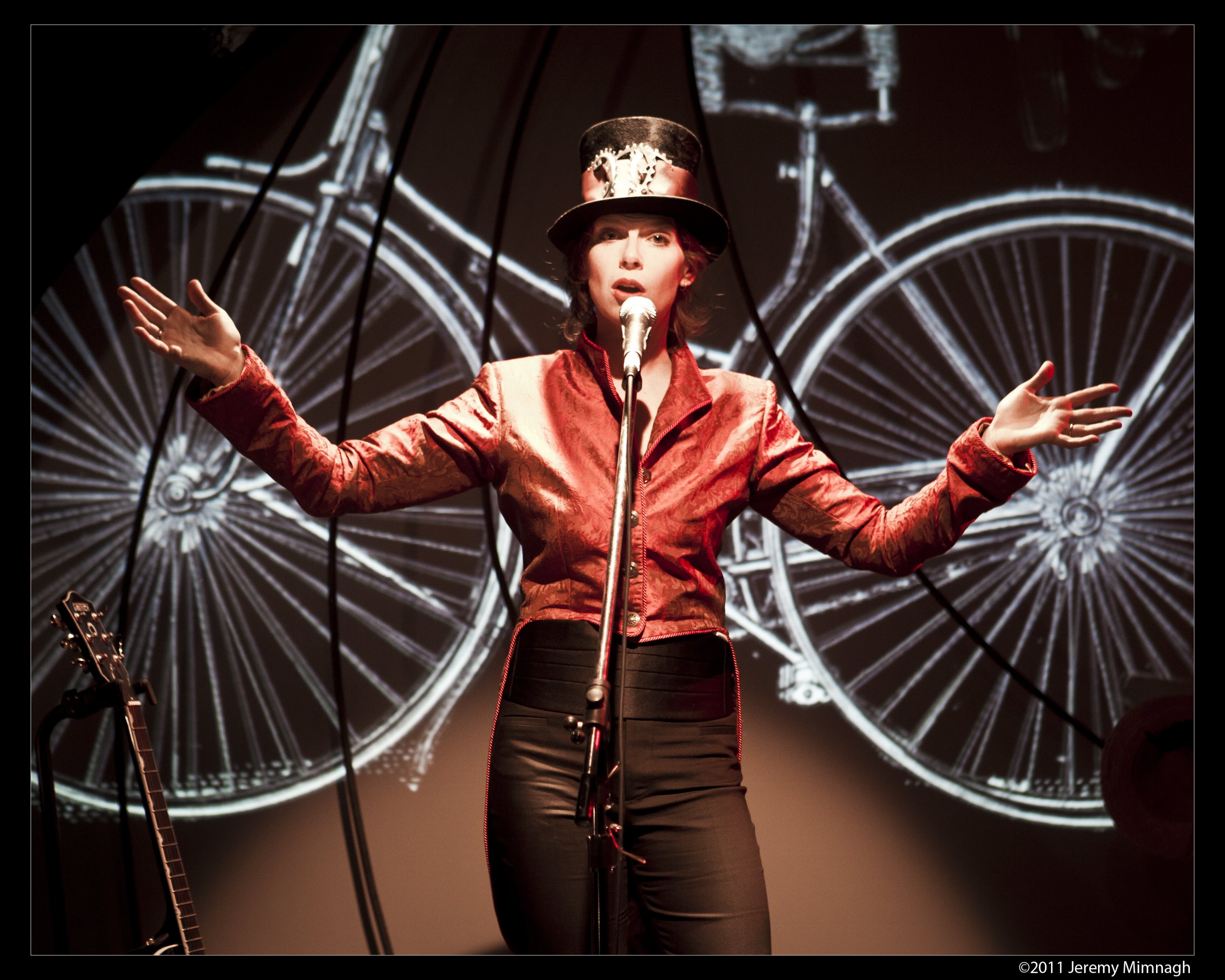
What's so good about a play about the bicycle?
What I didn't know about the bicycle before attending the play was this: the bicycle, in fact, was an important instrument for social change during the women's suffrage movement.
At the opening of the play, which is sort of a mash-up of ballads, catchy songs, and spoken-word pieces, Evalyn Parry emerges and does an impressive recital of Instructions on Learning to Ride a Bicycle, a pamphlet published by Miss Frances Willard, one of the most important suffragettes in history. After learning to ride a bicycle at 51 years old, she was so taken with this efficient mode of self-transportation that she wrote a pamphlet about it, declaring that "all women must all learn to ride, or fall into the sluiceways of oblivion and despair."
Wow. It definitely puts getting on my bike and rollin' around town feel a little less frivolous.
Not only are the stories that Parry weaves together hilarious, fascinating, and inspiring, but her vocals and guitar are backed up by... you guessed it, a bike. Brad Hart, Parry's accompanist who sports a fitting handlebar moustache, literally brings a vintage CCM bicycle to life by playing it like an instrument, suspended on a stand and connected to contact microphones.
The variety of sounds Hart can produce on a bicycle is, to say the least, a little mind-blowing. By using a combination of drum sticks, tuned bells, the spokes, frame, seat, and even the wheels themselves, he adds a unique and fitting element to Parry's songwriting.
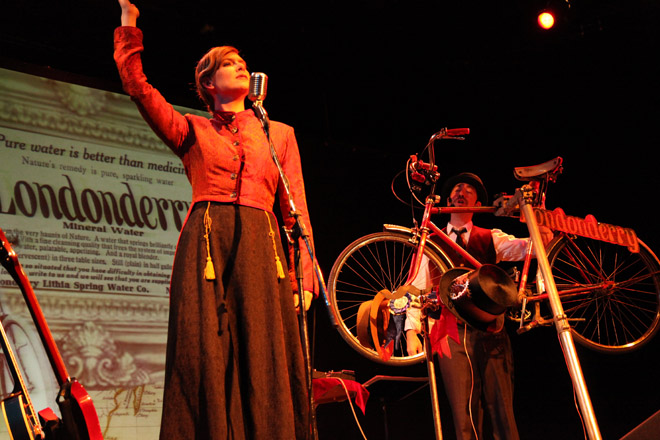
The bicycle as an instrument of social change
SPIN is inspired in part by the amazing true story of Annie Londonderry, the first woman to ride around the world on a bicycle in 1894. Not only was 23 year old Annie Londonderry (not her real last name, Londonderry Lithia was a mineral water manufacturer who sponsored her ride) unusual in that she accepted this unusual challenge, leaving her three kids and husband behind in Boston, but what I found striking (and ingenious) was that she scheduled press events everywhere she went. She sold advertising space all over her clothes and her bike - what a hustler!
This is just one of the examples that Evalyn Parry uses to illustrate how important the bicycle became to women in the late nineteenth century; for the first time ever women had a quick, easy, and most importantly an independent method of getting around.
The bicycle did more than just give ladies a way to get around, however: it also changed the way that we dressed. Using Annie Londonderry as an example of this sartorial shift, Parry paints a hilarious scene of Londonderry riding into a city and blowing people's minds with her masculine attire and her penchant for not giving a damn about it, thank you very much.
"Taking your life into your own hands"
One of the recurring themes throughout the play is the idea that the rider is connected to the bicycle, and that it allows them the freedom to go where they want, whenever they want, on their own terms. Parry weaves the idea of using your heart to move yourself around on your bike, and the idea that the bicycle and all it represents is connected to you as you ride around, beautifully.
"Taking your life into your own hands" also has a double meaning, referring to the suffragette movement and women's rights. As Parry points out throughout the play women's rights are the result of women "taking their lives into their own hands" and not allowing it to be dictated by men, and that the bicycle was one of the first ways in which women were able to start asserting their own independence in stodgy Victorian society.
Two-wheeled words/to wield words
To be honest, when I agreed to see the play I didn't quite know what I was signing up for, but I certainly didn't expect a cabaret-style, spoken-word/musical history lesson on women's rights featuring a bicycle as a backup instrument.
More importantly, however, SPIN made me appreciate what it means to be able to put on my pants and hop on my bike to go do whatever I please. As a woman who gets to enjoy a lifestyle which is a direct result of the hard work of so many women before me, it felt good to have the opportunity to develop a deeper appreciation for something that I already love so much (cycling).
In fact, I was so impressed by the play that it made me want to pull Barbara our, slap some giant winter tires on her, and ride that girl all around town. And in the middle of a frigid Winnipeg winter, that's saying something.
SPIN runs at the Prairie Theatre Exchange until January 31st. Grab your tickets here.
